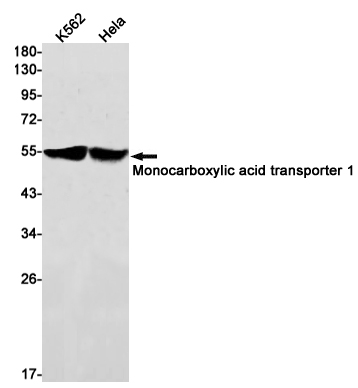
| WB | 1/500-1/1000 | Human,Mouse,Rat |
| IF | 咨询技术 | Human,Mouse,Rat |
| IHC | 咨询技术 | Human,Mouse,Rat |
| ICC | 技术咨询 | Human,Mouse,Rat |
| FCM | 咨询技术 | Human,Mouse,Rat |
| Elisa | 咨询技术 | Human,Mouse,Rat |
| Aliases | HHF7; MCT 1; MCT; Slc16a1 |
| Entrez GeneID | 6566 |
| WB Predicted band size | Calculated MW: 54 kDa; Observed MW: 54 kDa |
| Host/Isotype | Rabbit IgG |
| Antibody Type | Primary antibody |
| Storage | Store at 4°C short term. Aliquot and store at -20°C long term. Avoid freeze/thaw cycles. |
| Species Reactivity | Human |
| Immunogen | A synthetic peptide of human Monocarboxylic acid transporter 1 |
| Formulation | Purified antibody in TBS with 0.05% sodium azide,0.05%BSA and 50% glycerol. |
+ +
以下是3篇关于Monocarboxylic Acid Transporter 1(MCT1)抗体的关键文献,按作者和内容概括整理:
---
1. **"Monocarboxylate transporter (MCT1) abundance in red and white muscle: effects of training-induced lactate transport capacity activation"**
*Authors: Bonen A. et al.*
**摘要**:通过Western blot和免疫荧光技术验证MCT1抗体特异性,研究大鼠骨骼肌中MCT1蛋白表达与运动训练的关系,发现训练显著提升MCT1在细胞膜定位水平。
2. **"CD147 is tightly associated with lactate transporters MCT1 and MCT4 and facilitates their cell surface expression"**
*Authors: Kirk P. et al.*
**摘要**:利用MCT1抗体进行免疫沉淀和免疫细胞化学分析,揭示MCT1与CD147蛋白的相互作用机制,证明CD147对MCT1膜定位的调控作用。
3. **"Immunohistochemical localization of monocarboxylate transporters in the rat nervous system"**
*Authors: Lin S.T. et al.*
**摘要**:采用特异性MCT1抗体对大鼠神经系统进行免疫组化分析,发现MCT1在血脑屏障内皮细胞及神经元中高表达,支持其参与乳酸跨膜转运的功能。
---
这些文献均通过抗体技术(如Western blot、免疫组化)研究MCT1的分布、调控及生理病理意义,可作为抗体应用的关键参考。如需扩展,可进一步检索近年研究MCT1与癌症代谢或神经系统疾病的论文。
Monocarboxylic Acid Transporter 1 (MCT1), encoded by the *SLC16A1* gene, is a transmembrane protein responsible for transporting monocarboxylates like lactate, pyruvate, and ketone bodies across cell membranes. It plays a critical role in cellular metabolism, particularly in tissues with high energy demands, such as muscles, the brain, and cancer cells. MCT1 facilitates the bidirectional transport of lactate, supporting metabolic coupling between glycolytic and oxidative cells—a process vital in tumor microenvironments (Warburg effect) and during intense physical activity.
MCT1 antibodies are essential tools for studying its expression, localization, and function. These antibodies are typically developed against specific epitopes of the human or rodent MCT1 protein, which consists of 12 transmembrane domains with intracellular N- and C-termini. Researchers use MCT1 antibodies in techniques like Western blotting, immunohistochemistry (IHC), and immunofluorescence (IF) to investigate its tissue distribution, regulation under metabolic stress (e.g., hypoxia), and pathological roles in diseases like cancer, metabolic syndrome, and neurodegenerative disorders. Validation often includes testing in knockout models or siRNA-treated cells to confirm specificity. Recent studies also explore MCT1 as a therapeutic target, with antibodies aiding in biomarker analysis for drug development. Proper antibody selection depends on the experimental context, as post-translational modifications or protein-protein interactions (e.g., with CD147 chaperone) may influence detection.
×